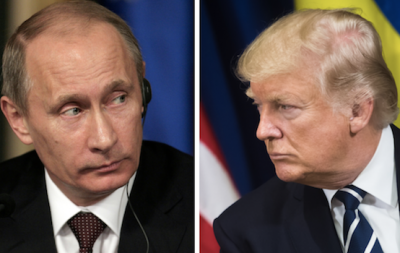US Anti-Russia Legislation Directed against Vladimir Putin

Largely by voice vote on Tuesday, House members passed four anti-Russia measures, continuing US war on the country by other means.
One bill targeted Vladimir Putin over the February 2015 killing of opposition figure Boris Nemtsov – lethally shot multiple times in central Moscow, an incident Russia’s leader had nothing to do with, nor any other Kremlin official.
The killing was strategically timed – ahead of a Vesna (Russian Spring anti-government) opposition march, used as a Nemtsov memorial march, falsely portraying him as a martyr.
At the time, Kremlin spokesman Dmitry Peskov said
“Putin has stressed that this brutal murder has all (the) signs of a contract murder and is extremely provocative.”
“The president has expressed his deep condolences to the family of tragically deceased Nemtsov.”
He was a Western financed self-serving opportunist. His killing had all the earmarks of a US-staged false flag. Cui bono is most important.
Clearly Putin had nothing to gain. Rogue US elements had lots to benefit from trying to destabilize Russia.
If Putin wanted Nemtsov dead, it’s inconceivable he’d order a Mafia-style contract killing. Lethally shooting him in central Moscow clearly ruled out Kremlin involvement. No evidence suggested a state-sponsored assassination.
Nemtsov’s death was and remains more valuable to Washington than using him alive as an impotent opposition figure with less than 5% public support when killed.
Ahead of Tuesday’s House vote, Russophobic House Foreign Affairs Committee chairman Eliot Engel turned truth on its head saying the following:
“It’s been four years since his death, but there’s been no proper investigation of his assassination (sic) and the cover-up and zero accountability for those responsible (sic). That’s certainly an outrage,” adding:
“This resolution condemns the Kremlin’s systematic targeting of its political opponents (sic) and calls on the administration to impose sanctions on those responsible for Nemtsov’s murder and cover-up (sic).”
Following an investigation by authorities, five Russian nationals were charged with Nemtzov’s murder.
Three other measures passed on Tuesday, largely by voice vote, showing near-unanimous anti-Russia hostility on Capitol Hill.
The Crimea Annexation (sic) Non-Recognition Act bans US recognition of Crimea as Russian territory.
The Vladimir Putin Transparency Act calls for the US intelligence community to determine and expose so-called “key networks” used by Russia’s president to strengthen political control (sic) and weaken democratic states (sic).
The Keeping Russian Entrapments Minimal and Limiting Intelligence Networks (Kremlin) Act requires the US director of national intelligence (DNI) to inform Congress of Moscow’s malign intent (sic) against the US and other NATO countries.
It also calls for determining potential Russian responses to expanded US/NATO involvement in Eastern Europe, along with identifying areas of Kremlin weakness to use against its ruling authorities.
Senate members will likely adopt similar anti-Russia measures. They follow multiple rounds of US sanctions on the country and July 2017 Countering America’s Adversaries Through Sanctions Act.
Targeting Russia, Iran and North Korea, it passed both houses with only five of 535 members casting dissenting votes, signed into law by Trump.
It called for expanding unilateral sanctions on these countries, imposed illegally for political reasons, unrelated to so-called “malign activities” – part of Washington’s hostile imperial agenda.
Responding to the House measures, Dmitry Peskov said the following:
“Such bills can only have an adverse effect (on bilateral relations). This very unfriendly, rampant anti-Russian sentiment line continues,” adding:
“This is a continuation of this emotional exaltation. Therefore, we do not expect any kind of sober-minded assessment from US legislators now.”
Congress is “strongly influenced by these emotions, which prevent them from assessing the situation soberly and show at least some kind of political will to take actions, which we believe would meet the two countries’ interests best of all.”
He expects anti-Russia sentiment to intensify ahead of US November 2020 presidential, congressional, and state elections.
A Final Comment
On Wednesday, five Republican and undemocratic Dem senators introduced the Defending American Security from Kremlin Aggression (DASKA)” Act.
Called the “sanctions bill from hell,” it targets Russia’s banking and energy sectors, along with its foreign debt and more, aiming to weaken its economy.
It falsely calls the Russian Federation a “state sponsor of terrorism” – the designation applicable to the US, NATO, Israel, and their imperial partners, not Moscow.
A statement by co-sponsors Bob Menendez, Lindsey Graham, Cory Gardner, Ben Cardin, and Jeanne Shaheen said the following in part:
The measure “seeks to increase economic, political, and diplomatic pressure on the Russian Federation in response to Russia’s interference in democratic processes abroad (sic), malign influence in Syria (sic), and aggression against Ukraine (sic), including in the Kerch Strait (sic).
It calls for sanctions on Russian banks, its energy and cyber sectors, investments in its foreign LNG projects (targeting Nord Stream 2 pipeline construction investors), its foreign debt, shipbuilding sector, as well as key political and private figures.
Its other provisions call for intensified hostile actions against Russia. A similar measure failed to pass last year.
This one is more likely to be adopted by both houses overwhelmingly and signed into law by Trump.
*
Note to readers: please click the share buttons below. Forward this article to your email lists. Crosspost on your blog site, internet forums. etc.
Award-winning author Stephen Lendman lives in Chicago. He can be reached at [email protected]. He is a Research Associate of the Centre for Research on Globalization (CRG)
His new book as editor and contributor is titled “Flashpoint in Ukraine: US Drive for Hegemony Risks WW III.”
http://www.claritypress.com/LendmanIII.html
Visit his blog site at sjlendman.blogspot.com.
Featured image: Russian President Vladimir Putin By Harold Escalona/shutterstock And President Trump By Drop of Light/Shutterstock

